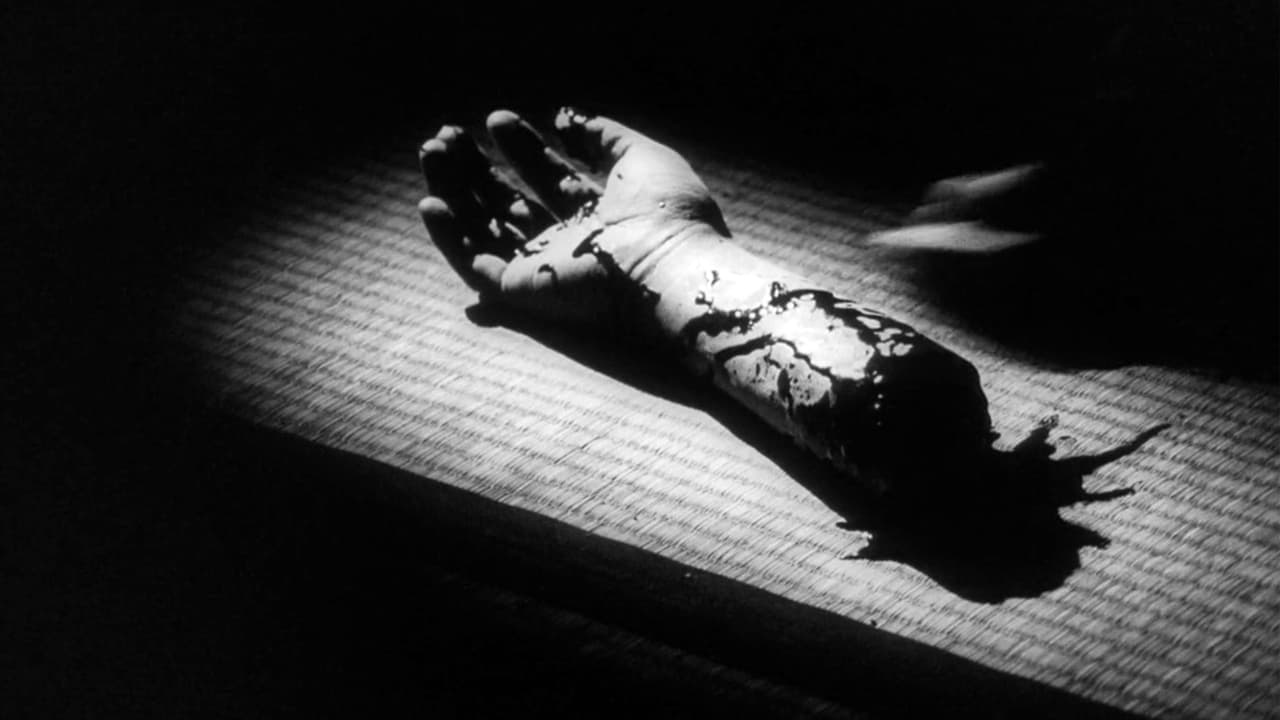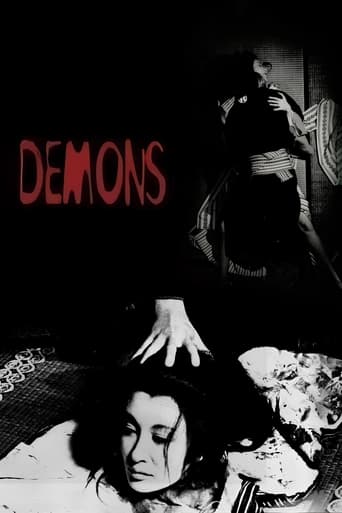

Absolutely Fantastic
... View MoreA bit overrated, but still an amazing film
... View MoreClose shines in drama with strong language, adult themes.
... View MoreThe movie is made so realistic it has a lot of that WoW feeling at the right moments and never tooo over the top. the suspense is done so well and the emotion is felt. Very well put together with the music and all.
... View More'Shura' also known as 'Demons' or 'maybe even better known as 'Pandemonium' is second feature by great experimenter Toshio Matsumoto. It is one of the most experimental samurai films I have ever seen, and one of the most disturbing revenge stories. The film begins with colorful sun setting to transform into bleak black and white cinematography. After a geisha deceives a samurai and robs him together with her husband, the samurai starts the bloody and twisted path of revenge that unravels many secrets and treats the viewer with such twists that makes M. Night Shyamalan go green with jealousy. The film is cool mixture of classic samurai movies and film-noir with the tasty sauce of Matsumoto's experimental techniques. More straightforward and less surreal than the director's better known 'Funeral Parade of Roses'.
... View MoreEntering an exchange project on ICM,my first viewing was the distinctive rustic Comedy Ko to tamo peva. Getting introduced to Asia Cinema via the 2016 IMDb Film Festival board (RIP),I was thrilled to see that other title in the exchange program be an Asia title I've not heard of before!,which led to me unmasking the demons.The plot:Exiled out of his samurai clan, Gengobe starts a passionate love affair with geisha Komon. Given the opportunity to re-join his group, Gengobe receives a reinstatement payment. Being the first payment he has received since the exile,Gengobe is horrified to find that someone has stolen his cash,which leads to Gengobe unleashing his avenging demons.View on the film:Towering above everyone, Katsuo Nakamura gives an extraordinary expressive performance as Gengobe,with Nakamura's high standing and curled arms giving Gengobe a demonic appearance. Set against a stripped backdrop, Nakamura digs into the lack of Gengobe's remorse with a burning fury being cast across his face. Enticing Gengobe, Yasuko Sanjo gives an emotionally raw performance as Komon,whose darting eyes and broken screams haunt the film.Grown out of the stage play Kamikakete Sango Taisetsu,writer/director Toshio Matsumoto and cinematographer Tatsuo Suzuki pulls the horror to its most stark.The bare theatrical black and white backdrops are cut down with the sliver of swords and the spilling of Gengobe's revenge laying the demons across the screen. Staying close to the roots of Tsuruya Nanboku and Shuji Ishizawa's play,the screenplay by Toshio Matsumoto strikes the film with a brittle intimacy, which crackles with an atmosphere of engulfing darkness gripping the exchanges between Gengobe and Komon. Keeping the horror mood bubbling just under Gengobe, Matsumoto makes Gengobe's outbursts ones that sting with suffocating, merciless doom,as Komon sees the faces of Gengobe's demons.
... View MoreIf anyone imagined how a Greek tragedy would look if it was set in feudal Japan, look no further. It is a harrowing, exhausting, depressive experience, but it's worth it. The film follows a once great warrior, now a Ronin (for those unfamiliar, Ronin is a samurai without a master), named Gengobe, who has sold all of his property to repay his debts. He is in love with a geisha who is to be married to a rich lord, unless someone pays 100 Ryō for her liberty. Once he realizes that he was being played by this geisha and her husband, of whose existence he was unaware of, he becomes hell bent on revenge.The film emits a strange sense of reality distortion. The film begins with a dream sequence, that is somewhat foreshadowing of things to happen. This theme is prevalent throughout the film. We can see things unfolding, only to realize that it was just a thought, or a fantasy of a certain characters. Reality tends to be different, albeit sometimes it can lead to the same conclusion. What was particularly striking was the way the graphic scenes of violence were portrayed. They were slowed down, they almost feel other-wordly, yet these graphic scenes are strangely beautiful. Highly contrasted Black and white cinematography helps this, we see characters illuminated against dark background like phantoms and the black blood coming out of the wounds becomes even more noticeable.Shura is a tale of vengeance than leads all the parties involved into an abyss of some sort. There is no bright light at the end of the tunnel. Because of mere 100 Ryō, these people have turned into "Demons" and they're lives became "Hell". This film isn't disturbing because of its visual content, but because of its emotional impact. Gengobe isn't a typical hero, the reason why one would want to root for him is because he is an agent of justice (like Monte Cristo), but not because he himself is a virtuous hero worth rooting for. It's easy to hate most, if not all of the characters, but at the same time, it's difficult not to feet pity for them. Seldom comes a film that makes one feel this way.This film is not for everyone, it's extremely pessimistic, it doesn't offer glimmers of hope. It's not an easy watch, but it's worth it. I highly recommend it to anyone who is interested in film as an art form.
... View MoreWOW. Rarely does a film leave you this speechless. Toshio Matsumoto's Demons is for sure one of the greatest Japanese New Wave films, and there were so many other masterpieces made during this unofficial film movement that it's really a wonder how still, everyone's associations to Japanese cinema are just the films from the '40s and '50s, with J-Horror and late Kurosawa added in to the mix. Demons is a haunting, ballsy and unforgettable film that will linger long in the memory.Of course, it comes with a fair share of annoying alternative titles - Bloodshed (too generic), Pandemonium (okay, well, I like this one), and Shura: The 48th Ronin (falsely implying that the main character is called Shura). The original title Shura is derived from asura, the Sanskrit name for a demon. In fact, Shura is sometimes regarded as a specific asura, a dark god of destruction, mayhem and violence, who doesn't rest until he spills someone's blood (echoing the mental state of the film's antihero). The word shura is additionally a Noh drama term for a play about ghosts and suffering warriors. So yeah, Demons is the most correct translation.It's based on the play Kamikakete sango taisetsu by Nanboku Tsuruya, who's better known for the often-adapted-to-film kabuki play The Ghost of Yatsuya. Indeed, Demons is a very theatrical film; few locations, all of them indoor and/or artificial, very few characters, shoestring budget, theatrical acting and dialog-driven drama. The movie is full B&W, but begins with a color shot of the sun setting to prepare the audiences for the type of film this is, and the rest of the film takes place in two nights. The dawn never breaks out, the space is extremely confined to make you as claustrophobic and paranoid as possible, not to mention the establishing shots are replaced by title cards. The theatrical style somewhat reminds me of Masahiro Shinoda's Double Suicide, except that one went full-kabuki (or rather bunraku) on us.Demons is a cruel, ironic tale of a samurai descending into madness and turning other characters' lives into Shakesperean lunacy. The film knows exactly what it wants to be - brutal and unforgiving, so much so that it was banned in UK for the depressing tone and violent content. And indeed, one particular scene... Uh. There's no sugarcoating or presenting violence as anything desirable, vengeance as noble, etc. No, this movie has a strong moral sentiment, but you're the one left to decide what the message is.The movie is also an alternate history tie-in with the historical event about the famous 47 ronin, a subject of many Japanese films. Here, the antihero belongs to the same clan (hence the last alternate title) but never interacts with them, nor do the other ones appear. The tale of the 47 ronin's vendetta is as noble and heroic as possible, yet our protagonist plunges into unimaginable depths to further spice the movie's sense of irony. There are no real relatable characters or anyone to root for, but you're still absolutely transfixed to the plot and can't look away. The atmosphere is splendid and the tension is unbelievable. The narrative also likes to trick you sometimes, by adding unsignalled violent fantasies of the antihero which tie in seamlessly with the rest of the story, only for him to suddenly snap out and the actual event to unvelop.Of course I have to mention the cinematography work on this film - it's simply mind-blowingly beautiful like in many, many other Japanese films. The overwhelming use of negative space which makes the characters look like disembodied spirits, the incredible chiaroscuro work - it's all there, and it's as beautiful as it is downright despicable.
... View More